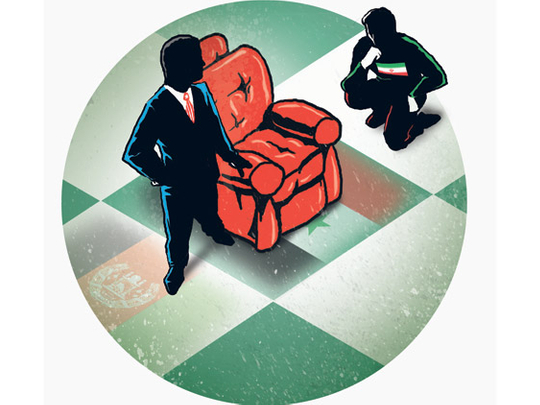
As the US prepares to withdraw the bulk of its combat forces from Iraq by the end of next month, concerns over the lack of progress in the formation of a new government grow.
The four-month stalemate is interpreted as being a result of the standoff between the US and Iran, the two key foreign powers in Iraq. Each hopes to redraw the political map of the country in a way that suits its own interests.
Most analysts tend to believe now that Iraq, and not nuclear weapons, is the key bone of contention between the two countries. Iran is eager to see the US withdraw from Iraq so that a formidable obstacle to it establishing military dominance in the Gulf is removed.
Another Iranian objective is to prevent the emergence of a pro-US government in Baghdad that would eventually resist its regional ambitions. Washington, on the other hand, wants to withdraw from Iraq because it faces growing challenges in Afghanistan — but without handing Iraq to Iran on a silver platter.
The US, therefore, seeks to find a way to counterbalance Iran by establishing a client government in Baghdad. The nuclear issue in this case is seen simply as an element of a broader geopolitical struggle between the two powers in the region.
Historically, Iraq has always been regarded by both the US and Iran as a strategic challenge. After the 1958 military coup, which ousted the monarchy in Iraq, the US supported the shah to contain the aspirations of pro-Moscow Iraqi officers. Similarly, following the 1979 Islamic revolution in Iran, Washington relied on Iraq to tame the revolutionary ambitions of the cleric's regime in Tehran.
When Iraq invaded Kuwait in 1990, Washington led an international coalition to expel the Iraqi forces and prevent Saddam Hussain from accumulating too much wealth and power. Throughout the 1990s, Washington tried to keep the Iranian and Iraqi threats at bay through its Dual Containment policy. When, from the late 1990s onwards, Iraq was moving toward ending its political isolation, Washington regarded that as an extremely destabilising development for its national interests in the Gulf.
Until the 2003 invasion, regional stability from Washington's viewpoint was based on the Iran-Iraq balance of power. The US invaded Iraq on the assumption that it could quickly defeat and dismantle its government and replace it with a pro-American regime, thereby restoring the balance of power. When that assessment proved inaccurate, Washington was forced to assume a policing role as well as acting as a shield to prevent Iran from dominating the country and thereby gaining control of the Gulf.
Regime change
Indeed, the US and Iran both wanted to eliminate Saddam's regime, and they collaborated to some extent during the invasion. But from there, their goals diverged. The Iranians hoped to establish a Shiite regime in Baghdad that would be under Tehran's influence. Washington sought to establish a regime that would thwart the Iranians.
From the very beginning, US strategy in Iraq was in shambles, to say the least. The de-Baathification process drove most of the Sunnis into opposition. At the same time, the Americans were trying to prevent Iran from installing a client government in Baghdad.
The end result was conflict. What was intended to be a short-term operation turned into an extended war, requiring long-term US military commitment. The US could not leave because it had created a situation in which Iraq was too weak to act as a counterbalance to Iran.
The Obama administration believes that the formation of a friendly Iraqi government with sufficient military capability to enforce law internally and to prevent Iran from having too much influence in the country is the only hope to salvage the US strategy. At the very least, Washington believes, any Iraqi government would have to be able to act independently from Iranian influence.
This raises several questions. Can the US form such a government before it leaves by the end of the summer? Can the Iraqis agree on the formation of a relatively strong government that is also on good terms with the US? What about Iran? Would it accept such a government?
So far, neither the US nor Iran have been able to put an appealing government in power. But as the stalemate persists and the date of the US withdrawal approaches, Iraq is set to pay the heaviest price for this struggle of wills between foreign powers.
Dr Marwan Al Kabalan is a member of the Centre for Strategic Studies and Research at Damascus University in Syria.










